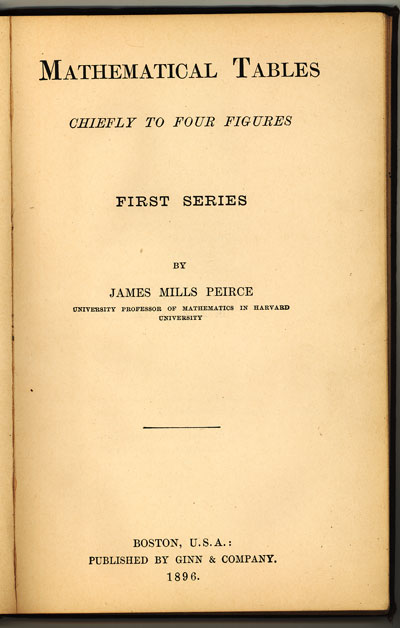Difference between revisions of "Wilson Collection: James Mills Peirce: “Professor X”"
(James Mills Peirce) |
(James Mills Peirce) |
||
| Line 3: | Line 3: | ||
''(Title page of Mathematical Tables Chiefly to Four Figures | ''(Title page of Mathematical Tables Chiefly to Four Figures | ||
by James Mills Peirce, 1896)'' | by James Mills Peirce, 1896)'' | ||
| − | |||
| − | |||
'''James Mills Peirce: “Professor X”''' | '''James Mills Peirce: “Professor X”''' | ||
Revision as of 11:01, 26 November 2012
(Title page of Mathematical Tables Chiefly to Four Figures by James Mills Peirce, 1896)
James Mills Peirce: “Professor X”
Homosexual case studies populated late-century medical literature. In Krafft-Ebing's book Psychopathia Sexualis (1893), “Case 99,” a male, “never lost for an instant the feeling of being a woman.”[1] Case 106, identified as “Mrs. M,” “would run after pretty girls...for hours at a time.”[2]
The book, Sexual Inversion, by influential British sexologist Havelock Ellis also contained in-depth case histories. In 1897 it featured a letter by “Professor X.” Circumstantial, but very convincing evidence has identified the letter writer as Harvard math professor, James Mills Peirce.[3] He wrote, “[W]e ought to think and speak of homosexual love, not as 'inverted' or 'abnormal'...but as being in itself a natural, pure and sound passion.”[4]
References
- ↑ R. von Krafft-Ebing, Psychopathia Sexualis, with Especial Reference to Contrary Sexual Instinct: A Medico-Legal Study, authorized translation…by Charles Gilbert Chaddock (Philadelphia: The F.A. Davis Company, 1893), 211.
- ↑ Krafft-Ebing, 233.
- ↑ Hubert Kennedy, “The Case for James Mills Peirce” in his “Six Articles on James Mills Peirce” (Concord: Peremptory Publications ebook, 2003), 13, accessed October 19, 2012, http://hubertkennedy.angelfire.com/Peirce.pdf.
- ↑ Jonathan Katz, Gay American History: Lesbians and Gay Men in the U.S.A. (New York: Thomas Y. Crowell, 1976), 376.
